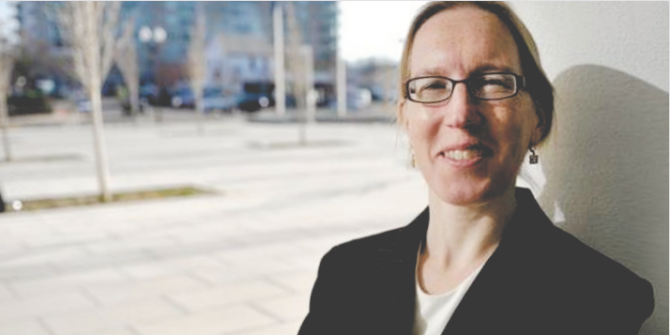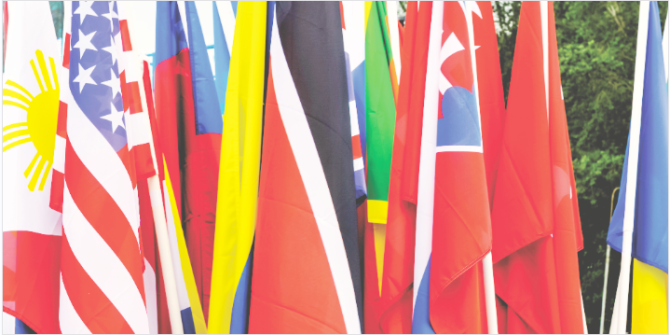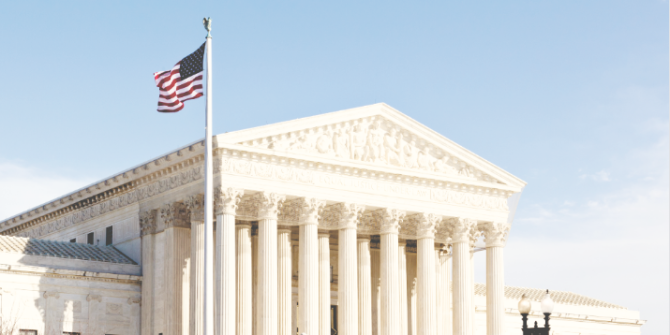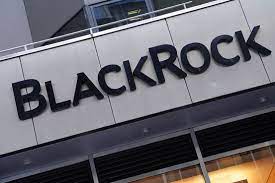US SEC Commissioner: The United States can learn from these countries for cryptocurrency policy

US SEC Commissioner Hester Peirce explained that the SEC can learn from other countries when completing its own encryption regulation. While emphasizing the unique and distinctive features of the US encryption system, the Commissioner highlighted cross-border considerations and detailed the cryptographic currency frameworks that apply in several countries.
The importance of cross-border considerations
SEC Commissioner Hester Peirce explained last week how the SEC regulates cryptographic assets and how the US can learn from other countries' regulatory frameworks when formulating its own policies. Her presentation was presented in Singapore on the “SUSS Convergence Forum: Inclusive Blockchain, Finance and Emerging Technologies” hosted by the Singapore University of Social Sciences.
One of the topics she discussed was cross-border cryptocurrency regulation. Peirce is known as crypto Mom in the encryption world, and she suggests: "The US SEC can seek advice from overseas counterparts on some of the toughest legal and policy issues in this area."
- Blockchain Weekly | In July, there were many security incidents in the exchanges and wallets. What happened to the market after the Litecoin was halved?
- The central bank accelerates the study of digital currency and sees how the progress of CBDC in various countries
- Global “City Currency” Inventory: These 13 countries and regions plan to “enclosure” currency

“Because many activities happen outside the US, we must consider our regulation with cross-border considerations, cooperation, and the sensitivity of what I call co-learning.” Peirce states:
Encryption supervision provides an opportunity for international regulators to learn from each other, and the resulting regulatory competition will allow us to see what works and what does not.
Peirce expected several obstacles. Because “the countries of the world are still in the early stages of deciding how and whether to regulate cryptocurrencies,” she predicts that there are uncertainties in the rules of these countries. The Commissioner further claims that due to the global nature of cryptocurrencies, it is difficult to determine the residence of a company in the niche, adding that determining “determining the exact nature of many assets – money, commodities, security, derivatives” can also be a challenge.
Bermuda’s custody framework
The first country that Peirce mentioned in the United States is Bermuda, and she points out that Bermuda is the only jurisdiction that conducts in-depth research on cryptocurrency protection. The island not only has a management system for the cryptocurrency business, but also publishes a draft guide for cryptocurrency hosting services. "It solves some of the difficulties, such as how to store hot and cold private keys while preserving the necessary liquidity, what steps should be taken to prevent unauthorized access, and how to conduct internal audits of transactions to ensure the integrity of the transaction.

“For example, I look forward to learning more about Bermuda’s regulatory framework and seeing if we can learn from it and see how our regulatory rules apply to the encryption environment,” she said.
These “regulatory laboratories” run by our international counterparts remind me of possible ways to make the US more welcoming cryptocurrency innovation.
Singapore's safe token method
Commissioner Peirce pointed out that Singapore has been at the forefront of many cryptocurrency-related activities, probably because it provides clear information to issuers in this market. She pointed out:
To a certain extent, I support the creation of a non-exclusive safe harbor for the distribution and sale of certain tokens, which is partly driven by the approach taken by Singapore. Singapore does not treat every token issue as a securities issue.

Peirce previously suggested that the US SEC adopt a safe harbor strategy for encrypted assets. “Debt distribution based on Safe Harbor must meet certain requirements – for example, to provide clear disclosure of assets, including mechanisms to change holders’ rights and to explain the use of funds before the issuer can use Safe Harbor,” she clarified . She said: "Rescue work may have time constraints, in case there is no feasible plan to build a network to operate the project depends on the safe harbor. Peirce details:
These requirements will be tailored to the needs of digital asset buyers, and our current regulations do not. Allow transactions to allow tokens to enter and exit in the hands of developers and users.
Hong Kong's licensing system and sandbox system
Commissioner Peirce also talked about Hong Kong's cryptographic regulatory framework. Its Securities and Futures Commission issued a guidance stating that securities tokens are "probably 'securities'," Peirce said, similar to what the SEC has done in the United States.
However, Peirce pointed out that Hong Kong also requires funds with crypto assets exceeding 10% of total assets to obtain the license of the Securities and Futures Commission, and has issued a notice to place the cryptocurrency trading platform in the regulatory sandbox.

According to the Financial Stability Board's Directory of Encrypted Assets Regulators, the Hong Kong Securities Regulatory Commission and the Hong Kong Monetary Authority are responsible for regulating the activities of cryptographic assets in China. The former regulates cryptographic assets within the definition of securities, while the latter covers cryptographic assets in investment products and wealth management services.
Thailand, Japan, Malta, Switzerland and France
In addition to the above countries, Peirce also mentioned five other countries in the speech – Japan, Thailand, Malta, Switzerland and France.
Japan is clearly ahead of other countries in terms of encryption regulation, and legalized cryptocurrency as a means of payment in April 2017. A cryptocurrency exchange must be registered with a financial services institution in the country. So far, 19 companies have been approved, but more than 110 operators have expressed interest in entering this field. Peirce added that China has recently passed legislation to incorporate the issuance of digital assets into its existing securities issuance legal framework.
Another Southeast Asian country mentioned by Peirce is Thailand, which uses a unique framework to manage cryptographic assets and classify them as cryptocurrencies or digital tokens. Encrypted exchanges, brokers, dealers, and ICO portals must be licensed and meet regulatory requirements. So far, five cryptographic exchanges and three ICO portals have been licensed.

Some European countries have also supervised cryptographic assets early. The Commissioner mentioned Malta, Switzerland and France. Last year, Malta passed a legislation that divided digital assets into unregulated virtual tokens and regulated virtual financial assets. Switzerland conducted initial guidance on ICOs in 2017 and issued more detailed guidance last year. France recently announced a new licensing system for ICOs and encryption service providers.
Regardless of the regulatory approach the SEC decides, Peirce believes that "continuous communication between global financial regulators will be very important" and reiterates:
We can also continue to learn from each other to fill our own regulatory loopholes and, where appropriate, to learn from other local development and testing frameworks.
Significant features of US regulatory approaches
The committee went on to point out some of the salient features of US regulated crypto assets. She stressed that the SEC only regulates securities, while other regulators are responsible for other areas such as commodities and currencies.
One of the characteristics of the US financial system is the large number of regulatory agencies. Not only do we have the state-federal responsibility assignments I just mentioned, but we also have multiple federal financial regulators.
“Another notable feature of American law is that the definition of security is a bit vague,” she added. She admits, “Unlike many other countries, we don’t have a 'safe’ exclusivity list.”
To determine if something is safe in the US, use the Howey test. The Commissioner said: "According to Howey's regulations, if something (including crypto assets) is invested in an ordinary business and the company's profit expectations are entirely from the efforts of others, then the property is a security."

SEC's current and future efforts
To understand and monitor cryptographic assets, the SEC established a strategic center called Finhub to coordinate the way the committee handles digital assets. Peirce said its employees hosted a financial technology forum in May and "meeted with hundreds of market participants to understand what they are doing and where they need clear regulation."
Last month, the agency limited the two symbolic issuances according to Regulation A+ and issued two letters of no action. The Financial Industry Regulatory Authority also recently approved applications for two unmanaged digital asset brokers.
In addition, the Commission issued two guidance notes. One of them was presented in April, outlining the identification of whether digital assets might be a safe framework. Another report was released last month in conjunction with the UK Financial Industry Regulatory Authority to discuss how digital asset securities are custody and how broker-dealers holding these securities comply with other regulatory requirements.
Peirce stressed that she "hopes to see the US Securities and Exchange Commission have a greater momentum in finalizing encryption regulation," so that the United States will not lag behind other countries in attracting cryptocurrency. Her conclusion is:
Although I believe that a single global regulatory framework will be unwise, regulators can create a healthy environment for growth in this new market by sharing information, thus making cross-border transactions smoother.
Author: Chain to Finance
We will continue to update Blocking; if you have any questions or suggestions, please contact us!
Was this article helpful?
93 out of 132 found this helpful
Related articles
- China's central bank will speed up research and development of legal digital currency; President of PayPal confirms that Libra will go online early next year
- More than 100,000 new ASIC mining machines were added in two weeks, and Bitcoin’s entire network computing power was innovated.
- Litecoin finished halving, and straight boy Charlie Lee has something to say
- Litecoin is expected to be halved tonight, after the halving, the mining machine will become scrap iron?
- Comment: What is the currency ring now? What is the chain? What about the future?
- The Litecoin block reward was halved and the 24 hour increase was over 13%. The bull market engine started again?
- The volume of encrypted loans has exploded, and the total volume in the past 4 months is close to the previous 16 months.





